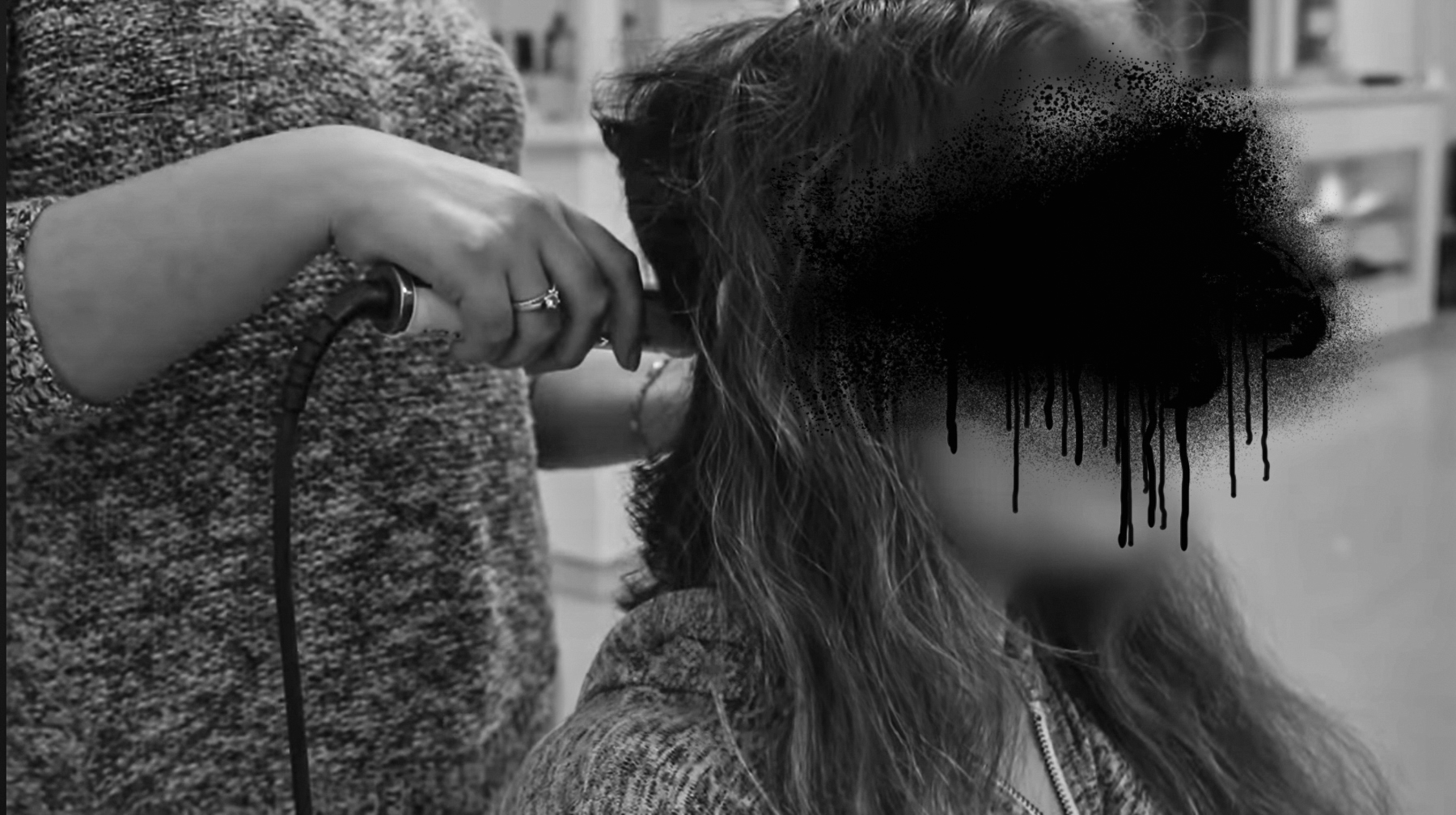Photo adapted from a screen grab from a March 2023 documentary by LCP-Assemblée Nationale about the plight of Afghanistan’s beauticians.
STORY BY BILAL AHMADZAI
In the heart of war-torn Afghanistan, Zakia, a talented beautician, found herself at the mercy of the Taliban’s oppressive regime. Since retaking the country in August 2021, the Taliban has instituted increasingly draconian edicts that have clawed back freedoms. In July 2023, beauty salons were banned.
The closure of beauty salons, once vibrant hubs of empowerment for women, cast a shadow over Zakia’s once bright future. As she shared her story with Anthrow Circus, the depth of despair in her eyes mirrored the struggles of countless Afghan women whose identities have been systematically erased by the regime. The Taliban’s actions have not only affected the physical spaces but also the self-esteem of Afghan women.
In the same way that the Ministry of Vice and Virtue had covered up pictures in beauty salon windows with spray paint, so Zakia said, “I had a gut feeling that the Taliban would one day spray-paint my face as well because I was a woman, a divorcée, and a beautician.” She said it was a nightmare to walk to the salon one day and discover “that every single picture of a woman had been spray-painted, which truly alarmed me.”
While women in Afghanistan had seen improvements in the preceding 20 years in their ability to escape abusive marriages, Afghan societal views on divorce still meant that even before the Taliban retook the country, living as a divorcée was like fighting against everyone and everything, Zakia explained. She said that divorced women are sometimes viewed as promiscuous, and men sometimes approach them for a one-night relationship or just for amusement, which is, as she described it, repulsive. The Taliban are against divorce, so now that they are running the country again, treatment of divorced women is only getting worse.
Zakia moved to Kabul to live with her sister because she hoped to find better treatment there than in the rural province she came from. In the province, she said, people’s imaginations ran wild and she wasn’t treated with respect, making it hard to make friends. However, she found that things unfortunately weren’t much better in Afghanistan’s capital city.
As Zakia told her story, her eyes did more talking than her words did. They told of the toll of the stress, blackmail, backbiting, loss of value, and lack of respect. The Taliban made her jobless, which made her lose herself. In addition to shutting down beauty salons, “the Taliban also locked down women’s self-confidence.” She added, “I might be relocated to the basement with the beautician’s equipment if I [hadn’t been] relocated to France.”
A Journey of Empowerment and Acceptance
In the midst of her challenges, Zakia found an unexpected ally in Solène Chalvon-Fioriti, a compassionate and brave French journalist reporting from Afghanistan, whose unwavering support became a guiding light in Zakia’s darkest moments. Together they traversed the nuances of language, tradition, and societal norms, forging a bond rooted in empowerment and acceptance. Through this friendship, Zakia found a path to France, arriving last September.
In the vibrant tapestry of France, Zakia discovered a newfound sense of freedom, a space where she could shed the labels of her past and embrace her identity with pride. “I heard people backbiting about my divorce when I was in Afghanistan,” she said. “Women were nice and friendly to me when I was out in public or at the salon, but when they inquired about my marital status, I felt helpless to respond.” Their questions returned her to the nightmare she experienced in marriage. Thinking of it sometimes made her start crying. People’s hurtful change of behavior toward her when they learned of her divorce added to the pain she had already experienced.
But now things are different. “Now that I’m in France, I even fail to remember that I’m divorced.”
In the country that welcomed her, Zakia stepped into a world of unfamiliarity that was yet filled with opportunity. The bustling streets of Paris whispered promises of a fresh start, a chance to redefine herself beyond the confines of her past. Each day brought with it a renewed sense of purpose as Zakia navigated the complexities of a new culture, shedding the layers of her old life to embrace the possibilities that lay ahead.
From Ashes to Aspirations
The shuttering of Afghanistan’s life-filled beauty salons symbolized the stripping of identity for Zakia and her fellow beauticians. The mirrors that once reflected beauty now lie dormant in basements, giving silent testimony to the resilience of Afghan women. Despite the challenges she faced, Zakia emerged as a beacon of hope, determined to rebuild her life and pursue her dreams of entrepreneurship in a land that celebrates diversity and individuality more than her homeland did.
In a first step toward her new dreams, Zakia is determinedly studying French. Once she has learned the language, she hopes to work for a time in an established salon. From there she dreams of one day opening her own beauty salon in France. She wants to be a businesswoman in her new country.
Zakia’s journey from the embattled streets of Afghanistan to the vibrant landscapes of France stands as a testament to the resilience and fortitude of women in the face of adversity. Her story, marked by courage, perseverance, and unwavering hope, serves as an inspiration to all who dare to dream beyond their circumstances. As Zakia embarks on a new chapter filled with promise and possibility, her narrative echoes the timeless truth of the human spirit’s ability to rise from the ashes of despair and embrace the beauty of rebirth.

